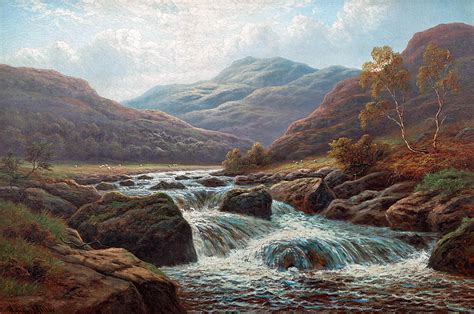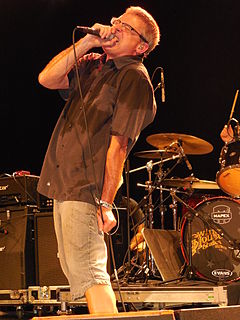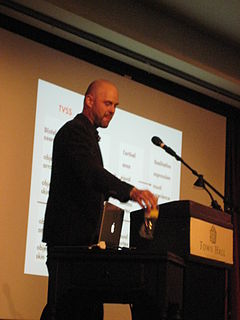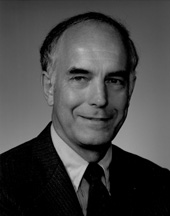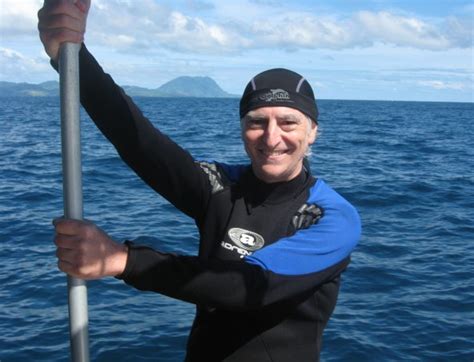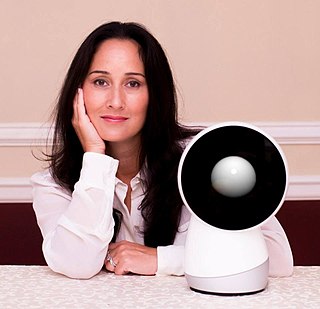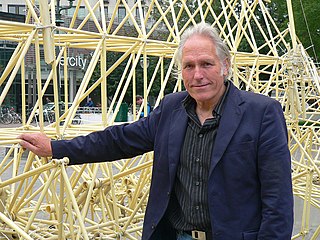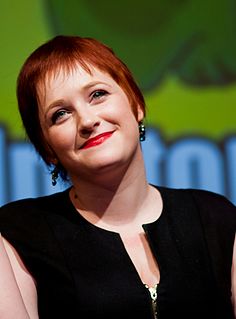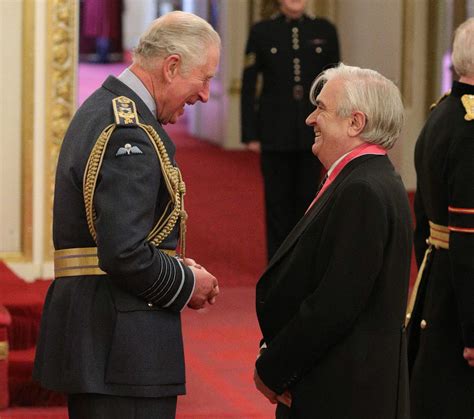Top 1200 Good Science Quotes & Sayings - Page 5
Explore popular Good Science quotes.
Last updated on November 20, 2024.
One can truly say that the irresistible progress of natural science since the time of Galileo has made its first halt before the study of the higher parts of the brain, the organ of the most complicated relations of the animal to the external world. And it seems, and not without reason, that now is the really critical moment for natural science; for the brain, in its highest complexity-the human brain-which created and creates natural science, itself becomes the object of this science.
I very much was inspired by Bill Bryson. He does cover science, but more often, it's a mixture of science and travel, and whatever he happens to be writing about - Shakespeare, Australia, the United Kingdom, or when he covers science in 'A Short History Of Nearly Everything' - he has an incredible ability to be both entertaining and enlightening.
The necessary precondition for the birth of science as we know it is, it would seem, the diffusion through society of the belief that the universe is both rational and contingent. Such a belief is the presupposition of modern science and cannot by any conceivable argument be a product of science. One has to ask: Upon what is this belief founded?
But in the end, science does not provide the answers most of us require. Its story of our origins and of our end is, to say the least, unsatisfactory. To the question, "How did it all begin?", science answers, "Probably by an accident." To the question, "How will it all end?", science answers, "Probably by an accident." And to many people, the accidental life is not worth living. Moreover, the science-god has no answer to the question, "Why are we here?" and, to the question, "What moral instructions do you give us?", the science-god maintains silence.
We live in a scientific age, yet we assume that knowledge of science is the prerogative of only a small number of human beings, isolated and priestlike in their laboratories. This is not true. The materials of science are the materials of life itself. Science is part of the reality of living; it is the way, the how and the why for everything in our experience.
I think science has a better story to tell than anyone else has been able to tell and that's because it's based on the rigorous winnowing that science and scientists are always doing in order to find out what's really happening. I think it's really good to encourage generally our ability to tell stories and that's a great skill that we come by naturally, so I'm excited about that.
I can think of very few science books I've read that I've called useful. What they've been is wonderful. They've actually made me feel that the world around me is a much fuller, much more wonderful, much more awesome place than I ever realized it was. That has been, for me, the wonder of science. That's why science fiction retains its compelling fascination for people. That's why the move of science fiction into biology is so intriguing. I think that science has got a wonderful story to tell.
However the great successes of science - Galileo's telescopic observations, Newton's law of gravity, etc - all of this great success caused people to sort of say, what if we could establish religion on that same successful basis? What if we could have a good rational foundation for religious belief. What if religion could be sort of like science. Of course, that can't be.
This [the opening of the Vatican City radio station built by Marconi earlier in 1931] was a new demonstration of the harmony between science and religion that each fresh conquest of science ever more luminously confirms, so that one may say that those who speak of the incompatibility of science and religion either make science say that which it never said or make religion say that which it never taught.
There is no science in global warming. "Mr. Limbaugh, that's typical of what you! That's the most outrageous statement I've ever heard anybody ever make! No science in global warming?" Do you know how I know there's no science in global warming, folks? Because they tell us a "consensus of scientists" agrees that X. There is no consensus in science.
Literary science fiction is a very, very narrow band of the publishing business. I love science fiction in more of a pop-culture sense. And by the way, the line between science fiction and reality has blurred a lot in my life doing deep ocean expeditions and working on actual space projects and so on. So I tend to be more fascinated by the reality of the science-fiction world in which we live.
I think my science career had an arc to it that peaked in, let's say 2003/2004. I was in hog heaven, working in a corporation, getting paid pretty good money and doing really exciting research. And we had just done the Cool To Be You record, and I said well, we'll put this record out, but I can't tour it because I just want to do science. That's my gig, my future.
No science is immune to the infection of politics and the corruption of power. ... The time has come to consider how we might bring about a separation, as complete as possible, between Science and Government in all countries. I call this the disestablishment of science, in the same sense in which the churches have been disestablished and have become independent of the state.
I believe in rendering to science the things that belong to science. I have no problem with evolution or discussions of the age of the Earth, for I don't believe that we come anywhere near comprehending the mind of God or the workings of the universe. Science can explain a lot, but it cannot give us faith, and I think we need both.
The impossibility of separating the nomenclature of a science from the science itself, is owing to this, that every branch of physical science must consist of three things; the series of facts which are the objects of the science, the ideas which represent these facts, and the words by which these ideas are expressed. Like three impressions of the same seal, the word ought to produce the idea, and the idea to be a picture of the fact.
Ares always reemerges from the chaos. It will never go away. Athenian civilization defends itself from the forces of Ares with metis, or technology. Technology is built on science. Science is like the alchemists' uroburos, continually eating its own tail. The process of science doesn't work unless young scientists have the freedom to attack and tear down old dogmas, to engage in an ongoing Titanomachia. Science flourishes where art and free speech flourish.
He who has spent billions on churches, on mosques and on every kind of sanctuaries is guilty of not giving that money to the science! The path of sanctuary does not lead to God; the path of the faith does not lead to God; only the path of science leads to God! The bridge between man and the unknown God is not worshipping but it is science, only the science!
Our emphasis on science has resulted in an alarming rise in world populations, the demand and ever-increasing emphasis of science to improve their standards and maintain their vigor. I have been forced to the conclusion that an over-emphasis of science weakens character and upsets life's essential balance.
The best way to get students involved in science and want to follow either science careers or incorporate it in their lives or to achieve science literacy is to expose them to the various jobs in STEM. It's broad from biologists to electricians to nanotechnologists to building fusion engines. It's a wide range of things.
Restoration ecology is experimental science, a science of love and altruism. In its attempts to reverse the processes of ecosystem degradation it runs exactly counter to the market system, to land speculation, to the whole cultural attitude of regarding the Earth as commodity rather than community. It is a soft-souled science.
When I was little, I guess I was just an ordinary kid. But then things changed when I was in junior high. You know, kids that become geeks become one because of something. Like, they aren't good at sports, or girls don't like them. I, too, for some reason, got into things like science fiction and, well, especially science fiction as an escape.
I liked science very much. A science teacher in high school inspired me, and because of him, I began studying science at the university. But when I got there... well, the subject still attracted me a lot, but I had to do all these exams, and it was just like working in an office. I couldn't stand that.
In science, every question answered leads to 10 more. I love that science can never, ever be finished. From a young age, people think, 'Science is hard and boring.' We don't tell children, 'Yes, you have to learn these formulae and theorems, but then you go on to learn about nuclear reactions and stars.'
My science teachers always encouraged their classes to 'go out and discover something' because all scientific endeavors depend on observation and experimentation. Through such pursuits, anyone can find something new to science, and if it's truly novel, the entire edifice of science might have to be restructured.
I think evolution should be taught as an accepted principle. I say that also as the daughter of a school teacher, a science teacher, who has instilled in me a respect for science. I think it should be taught in our schools. I won't ever deny that I see the hand of God in this beautiful creation that is earth. But - that is not a part of state policy or a local curriculum in a school district. Science should be taught in science class.
I don't think any administration, when they come in, thinks that their job is to tell the scientists what the science looks like or to be quiet about the science. Scientists need to remain true and not allow science to be politicized. Scientists are not politicians, and no politician should consider themselves to be a scientist.
Statistics is the most important science in the whole world: for upon it depends the practical application of every other science and of every art: the one science essential to all political and social administration, all education, all organization based on experience, for it only gives results of our experience.























